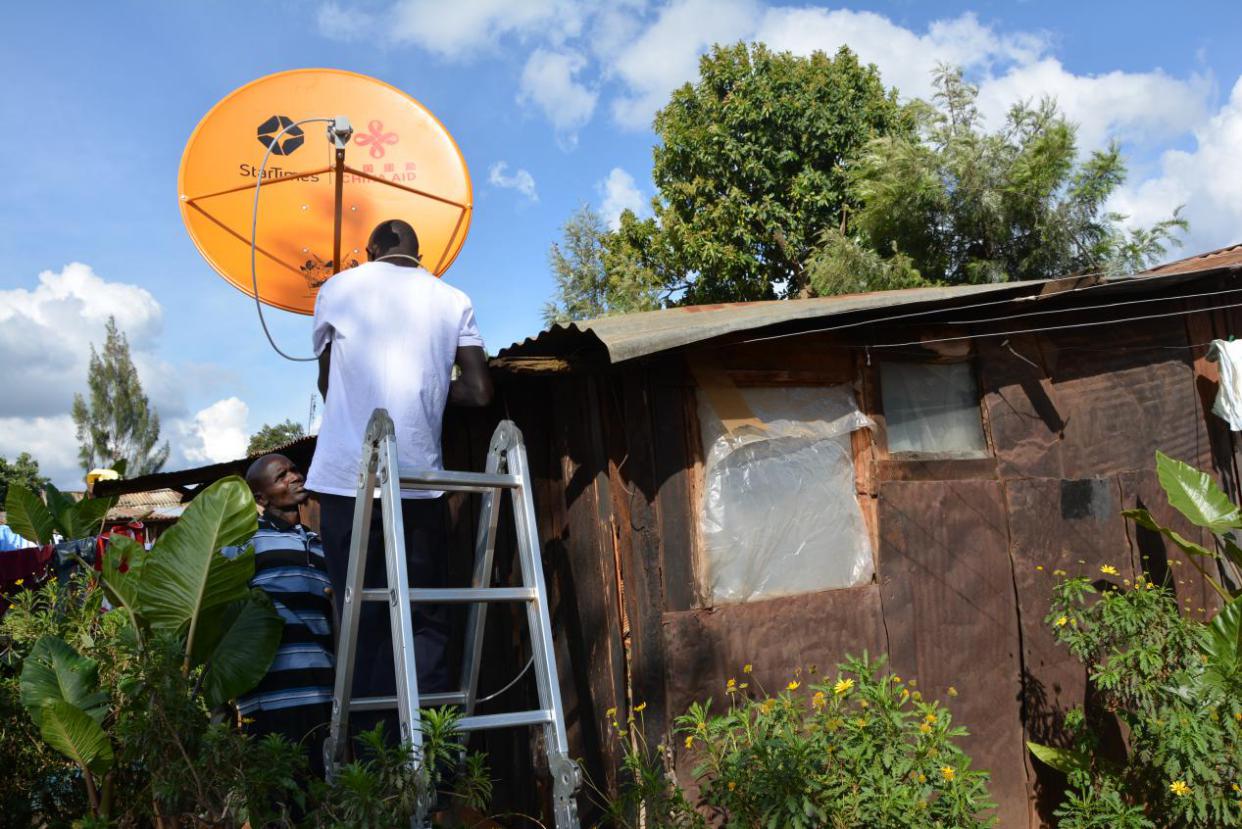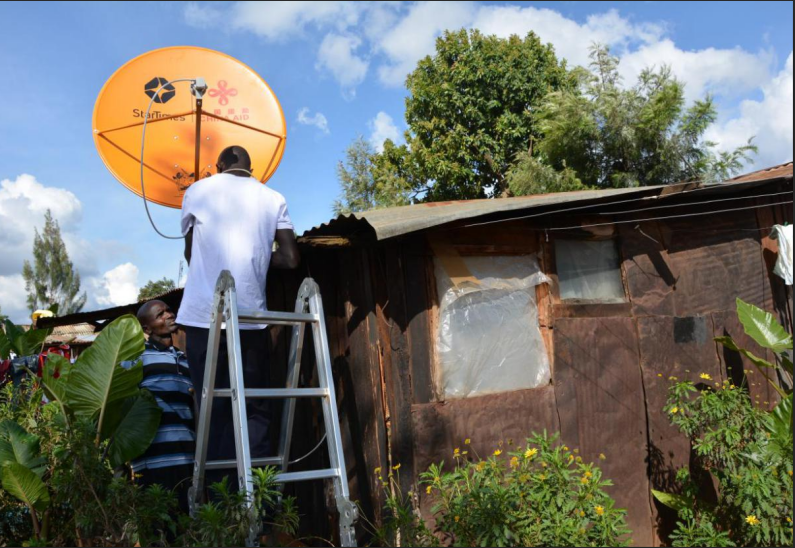
Two employees of StarTimes install a satellite dish for villagers at Likii Village, Laikipia County, Kenya, July 3, 2018. (Xinhua)
BEIJING, April 25 (Xinhua) -- At present, the global digital economy is booming and changing people's lives while driving the economic development. Over past years, China has developed a good track record in satellite communication, cross-border e-commerce and other fields, and it has also been working to share its achievements in these fields to the world through a raft of tangible projects. Whether in remote Africa or in the thriving Asia, digitalization has enabled smooth network, more efficient work and more convenient life... Committed to changing people's life, those projects, just like specks of light, form a beautiful "Digital Silk Road".
"Access to Satellite TV for 10,000 African Villages" offers African villagers access to the World Cup
The year 2014 is still fresh in the mind of Anthony Munyiri Munene, a football fan from Kenya. Right in that year, because his television had only five channels, he had to spend 40 shillings (one U.S. dollar equals about 101 Kenyan shillings) at the shop across the street to watch the World Cup with many people.
"Dozens of football fans crowded against one another in a very tiny room, with each craning his neck above the crowd to get a better view of the measly small screen. After the match finished, everyone got a sore neck..." recalled Muneinei who really had a terrible memory of the 2014 World Cup.
Yet things began to change in June 2018 when the "Access to Satellite TV for 10,000 African Villages" project was officially launched in Kenya. As Likii village was one of the first batch of pilot villages, more and more satellite dishes were installed there. "Thanks to the project, my long-awaited dream of snuggling against my sofa at my home to watch the World Cup with my family finally came true in 2018. Even more excitingly, I can watch the rebroadcast whenever I want to see those moments of great goal again," Muneinei said with excitement.
"Access to Satellite TV for 10,000 African Villages" is a China-Africa cooperation project in the humanity field put forward at the Johannesburg Summit of the Forum on China-Africa Cooperation with an aim of providing 10,000 African villages with access to digital television. Chinese digital TV operator StarTimes has been chosen to carry out the project and take charge of follow-up commercial operations and equipment maintenance.
"I would like to extend my sincere thanks to the 'Access to Satellite TV for 10,000 African Villages' project. Thanks to it, I can watch all the complete World Cup matches for the first time," said Joseph Runyenje Ropeyok, another football fan from Likii Village, adding "The project has opened a window on the world for African rural people who have long lived in a closed world."
So far, the "Access to Satellite TV for 10,000 African Villages" project in Kenya has been completed, and is in the middle of project acceptance. With a total investment of 8,427,000 U.S. dollars, this project covers 800 villages at 47 counties. In each village, two sets of solar projection TV systems, one set of solar digital TV systems and 20 series of TV programs have been offered to the local public institutions for free. Satellite TV signal receiving systems have been also installed freely for 20 households, with some free TV programs offered. The project has benefited 2,400 public institutions and 16,000 households in Kenya.
Intelligent logistics improves shopping experience for Indonesian consumers
On December 12, 2018, an Indonesian consumer called Lani received a parcel at 8:58 a.m. (local time). Inside was a pair of high-heeled shoes she bought at JD.ID at 0:00:01 a.m. on the day, but to her surprise, the delivery was so fast — she just got out of bed. Once exclusive to Chinese consumers, this great online shopping experience is now available for Indonesian consumers.
A population of nearly 300 million makes Indonesia the world's fourth most populous country, following China, India and America, indicating that Indonesia has a vast e-commerce market. In March 2016, JD.com developed and launched an Indonesian platform JD.ID. So far, it has attracted more than 20 million users.
JD.com managed to replicate its delivery standard "211 program" (same day delivery for orders submitted before 11AM and next day delivery before 3PM for orders submitted before 11PM) to its Indonesian operation through establishing a global smart supply chain network (GSSC). Meanwhile, considering local custom of going to church regularly, JD Logistics adjusted "211 program" into "210 program" (same day delivery for orders submitted before 10AM and next day delivery for orders submitted before 10PM). At present, this commitment is honored in 90 percent of its orders in the Greater Jakarta area.
According to JD Logistics CEO Wang Zhenhui, JD Logistics is making an all-out effort in the GSSC network. When those efforts pay off, it will embark on a world-wide improvement on its whole chain from procurement, production, and design to logistics through the GSSC network, and advance the unimpeded product flow, logistics, capital flow and information flow through technological and model innovation, in an effort to optimize efficiency and cut costs for its supply chain.
On September 28, 2018, a 7.4-magnitude earthquake hit Central Sulawesi, a province of Indonesia located at the center of the island of Sulawesi, followed by a tsunami, taking a heavy toll at the affected area. On hearing the news, JD.ID responded immediately by assisting in the disaster relief with its e-commerce network and logistics system in Indonesia.
Thanks to its prior efforts on logistics network system, people can directly donate materials and money to the disaster area through JD.ID's website and APP, and JD.ID logistics force then delivered these donations freely to the designated donation allocation spots in the disaster area as fast as possible.
Moreover, JD.com opened a JD.ID X-Mart in Indonesia in August 2018, the first unmanned convenience store in Southeast Asia. Located at Jakarta's PIK Avenue Mall with an area of 270 square meters, the X-Mart sells a complete range of items such as clothing, home furnishing, beauty makeup, and daily fast moving consumer goods. Notably, it is also Southeast Asia's first intelligent consumer experience supermarket based on AI technology. When consumers enter the store, they only need to scan their faces to bind their personal identity and payment information. Because of the RFID radio frequency identification technology adopted in the store, consumers only need to go through the intelligent settlement channel to complete the settlement, bringing Indonesian consumers unbeatable shopping experience.
A shopper described his/her shopping experience through his/her social media account: At Jakarta-based JD.ID X-Mart, consumers can open a mobile APP on their phones where their credit cards are bound to scan the store's QR code and the monitor unit will work to scan their faces. After picking out what they want, they can simply walk through the settlement channel to scan their faces again, and then their shopping list with price of each item and total price will appear for check. The moment they finish settlement, the door will open automatically to let them out. How convenient and efficient!
Digitalization is making a difference for our life even before we know it. (Contributed by Li Zhilan, Jin Zheng, Ding Lei, edited by Gu Shanshan)




 A single purchase
A single purchase









